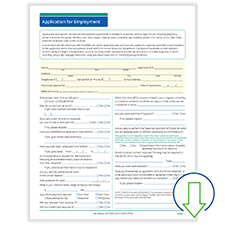
Did you know that all states except Montana are ‘at will’ states? This means employers can terminate the employment relationship at any time – with or without notice and with or without a reason.
That fact withstanding, firing an employee without warning is never wise. Rather, it’s a best practice to verbally counsel the individual and, if the problem persists, follow up with written warnings leading up to termination. This step-by-step progressive discipline approach helps protect your business in a potential lawsuit.
Here's a closer look at eight potential scenarios you may encounter, and when it’s appropriate to terminate immediately:
Threats of Violence
Fire on the spot? Yes
When disgruntled employees take out their anger at work, the consequences can be dire. That’s why verbal threats, stalking or outright acts of violence are grounds for immediate termination. Depending on the situation, you may need to involve another person as a witness to the firing — or even call the police if the behavior has escalated.
Neglecting to Follow Safety Measures
Fire on the Spot? Yes
You’re responsible for providing a safe workplace. Assuming you’re complying with the safety standards that apply to your business and industry — and have trained employees on the proper precautions — you can and should immediately terminate an employee who blatantly ignores these safety measures.
Profanity Toward a Coworker or Customer
Fire on the spot? Yes
Vulgar outbursts against a colleague or customer should never be ignored. Religious, racial, ethnic and gender-oriented slurs are especially problematic because they can quickly veer into harassment. An employee who swears too much may only need counseling, but one who hurls profanities or slurs in a heated argument should be shown the door.
Frequent Absences
Fire on the Spot? No
Excessive absenteeism should always be addressed, especially when you’re dealing with employees who are always late or frequently call out sick. But be careful. Some absences are protected under the Family and Medical Leave Act (FMLA) and other employment laws and don’t warrant disciplinary action or discharge. Get the facts before you make a move.
Be aware that some workplace situations don’t warrant progressive discipline and may be cause for immediate termination, such as threats of violence or stealing.
Sharing Salary or Bonus Information
Fire on the Spot? No
Although you would prefer that employees not talk about their wages, you can’t stop them from doing so. The National Labor Relations Act (NLRA) gives employees the right to discuss hours, pay and working conditions. In fact, such discussions, even on social media, are a form of “protected concerted activity.”
Complaining about Discrimination or Harassment
Fire on the spot? No
Firing an employee who complains about discrimination or harassment (or reports illegal or unethical activity) is considered illegal retaliation. Other forms of adverse action, such as demotion, salary reduction or change in job assignment, are also prohibited. Retaliation is against the law and can result in significant penalties even greater than the underlying accusation or complaint of wrongdoing.
Poor Performance from a New Hire
Fire on the Spot? Maybe
You had high hopes for your new hire but after a month on the job, it’s clear the individual is not a good fit. Although the employee is on probation and you’re technically allowed to terminate with or without cause, this approach is dangerous. It’s best to speak with the employee and document the performance shortcomings to support your termination decision. If the issue is related to anything in the above scenarios, however, you can fire the person immediately.
Subpar Output from an Independent Contractor
Fire on the Spot? Maybe
First things first: An independent contractor (such as a freelancer, consultant or other skilled worker) is not an employee under Department of Labor (DOL) and IRS guidelines. As such, the issue is not “how to fire a contract employee,” but how and when you can terminate a contract worker. Under the terms of a defined work contract or formal agreement, you may be entitled to certain actions for subpar work or other agreed upon provisions. This written document will dictate how you broach the situation and end the relationship.
Manage Employee Performance with the Appropriate Forms
If an employee’s performance ever becomes a problem, you want to handle it carefully. This includes progressive discipline and prompt, appropriate documentation. The Performance Management Fill-and-Save™ HR Form Library can help you take control of the situation while also providing a legal “paper trail” if termination becomes the only option.
Related Content:
Be Careful How You Respond: Wrong Termination Due to Retaliation is Always a Risk





 Shopping cart
Shopping cart





